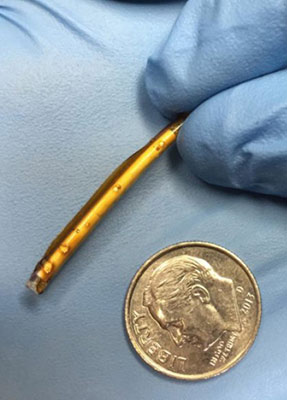Revolutionary anti-HIV skin implant developed

The tiny implant could revolutionise the treatment & prevention of HIV (Pic: Oak Crest Institute)
Could ARV pills become a thing of the past? Scientists have developed a revolutionary implant that automatically administers anti-HIV medicine.
Researchers from the Oak Crest Institute of Science in California have developed the matchstick size implant, similar to a contraceptive implant, placed under the skin to deliver a controlled, sustained release of ARV drugs for up to 40 days.
The implant has thus far only been tested in dogs but appears to have no adverse side effects.
“To our knowledge this is the first implant to be used for this purpose,” said Dr Marc Baum, Senior Faculty and founder of Oak Crest.
HIV infections are increasingly being managed and prevented through antiretroviral (ARV) drugs. The use of PrEP (pre-exposure prophylaxis), which involves HIV-negative individuals taking ARVs to reduce their risk of becoming infected, is now a reality.
While PrEP use by gay, bisexual and other men who have sex with men has been endorsed by America’s Centres for Disease Control and Prevention (CDC) and the World Health Organisation (WHO), the effectiveness of these medications is reliant on consistent and ongoing used, which can be a challenge.
The new implant could go a long way to solve this problem, both for HIV negative individuals and for those living with HIV.
“It’s unfortunate, but patients do not always follow the dosing instructions as prescribed,” said Dr Baum, “in clinical trials erratic administration of drugs has led to highly variable efficacy outcomes. That’s what piqued our interest in the possible use of a subdermal implant for the prevention of HIV.”
The scientists aim to develop a subdermal implant for HIV prevention that will remain effective for an astonishing 12 months.
The use of subdermal implants for contraception began in the United States in 1993. They prevent pregnancy by releasing hormones into a women’s body.
The findings were published in the journal Antimicrobial Agents and Chemotherapy.
Leave a Reply